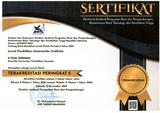IMPLEMENTASI MODEL PEMBELAJARAN INTERACTIVE ENGAGEMENT UNTUK MENINGKATKAN SELF EFFICACY DAN PRESTASI BELAJAR MATEMATIKA
DOI:
https://doi.org/10.23887/jjpm.v2i1.2589Abstract
Penelitian ini dilatarbelakangi oleh rendahnya self efficacy dan prestasi belajar siswa. Tujuan penelitian ini adalah untuk meningkatkan self efficacy dan prestasi belajar matematika siswa kelas VIII 3 SMP Negeri 2 Singaraja tahun pelajaran 2013/2014 serta mendeskripsikan tanggapan siswa terhadap implementasi model pembelajaran interactive engagement (IE) dalam pembelajaran matematika. Jenis penelitian ini tergolong dalam Penelitian Tindakan Kelas. Subjek penelitian adalah seluruh siswa kelas VIII 3 berjumlah 40 orang. Objek penelitian meliputi implementasi model pembelajaran interactive engagement, self efficacy, prestasi belajar, dan tanggapan siswa terkait implementasi model pembelajaran interactive engagement (IE). Data self efficacy dan tanggapan siswa dikumpulkan dengan angket, sedangkan prestasi belajar dikumpulkan dengan ¬tes jenis uraian. Data dianalisis menggunakan statistik deskriptif. Hasil penelitian menunjukkan 1) terjadi peningkatan self efficacy, pada siklus I rata-rata skor self efficacy 61,8, pada siklus III rata-rata skor self efficacy 77,32. Rata-rata skor self efficacy pada siklus III berada dalam kategori tinggi. 2) Terjadi peningkatan prestasi belajar, pada siklus I rata-rata nilai prestasi 68,78 dengan ketuntasan klasikal 55%, pada siklus II rata-rata nilai prestasi 74,87 dengan ketuntasan klasikal 82,5%, pada siklus III rata-rata nilai prestasi 80,15 dengan ketuntasan klasikal 87,5%. Rata- rata nilai prestasi belajar dan Ketuntasan Klasikal siswa berada dalam kategori tuntas pada siklus III. 3) Tanggapan siswa terhadap implementasi model pembelajaran interactive engagement berada pada kategori positif dengan rata-rata skor 53,17.Kata Kunci : Interactive engagement, Self efficacy, Prestasi.
This research is motivated by the lack of self efficacy and student’s learning achievement. The purposes of this research are improving student’s self efficacy and student’s learning achievement in junior High School 2 Singaraja grade VIII 3 on academic year 2013/2014 and describe the student’s response toward to the implementation of the interactive engagement model in study of mathematic. This research is classroom action research. The subjects of this study were 40 students of class VIII 3. Object research are implementation of the interactive engagement model, student’s self efficacy, student’s learning achievement, describe student’s response toward to the implementation of the interactive engagement model in study of mathematic. Data of self efficacy and student’s response were collected by using questionnaire while the learning achievement were collected by essay test. Data were analised using descriptive statistics. The results of the study showed 1) self efficacy increased, average score in the first cycle is 61,8 and the third cycle is 77,32. The means score of student’s self efficacy in third cycle was at complete category. 2) student’s achievement increased, average value in the first cycle is 68,78 with 55% classical completeness, average value in the second cycle is 74,87 with 82,5% classical completeness, average value in the third cycle is 80,15 with 87,5% classical completeness. The average value and classical completeness were at complete categories in third cycle. 3) The student’s responses to the implementation of interactive engagement model was in positive category with an average score 55,17.
keyword : Interactive engagement, Self efficacy, Achievement.
Published
2014-03-03
Issue
Section
Articles
License

Jurnal Pendidikan Matematika Undiksha is licensed under a Creative Commons Attribution-ShareAlike 4.0 International License.





